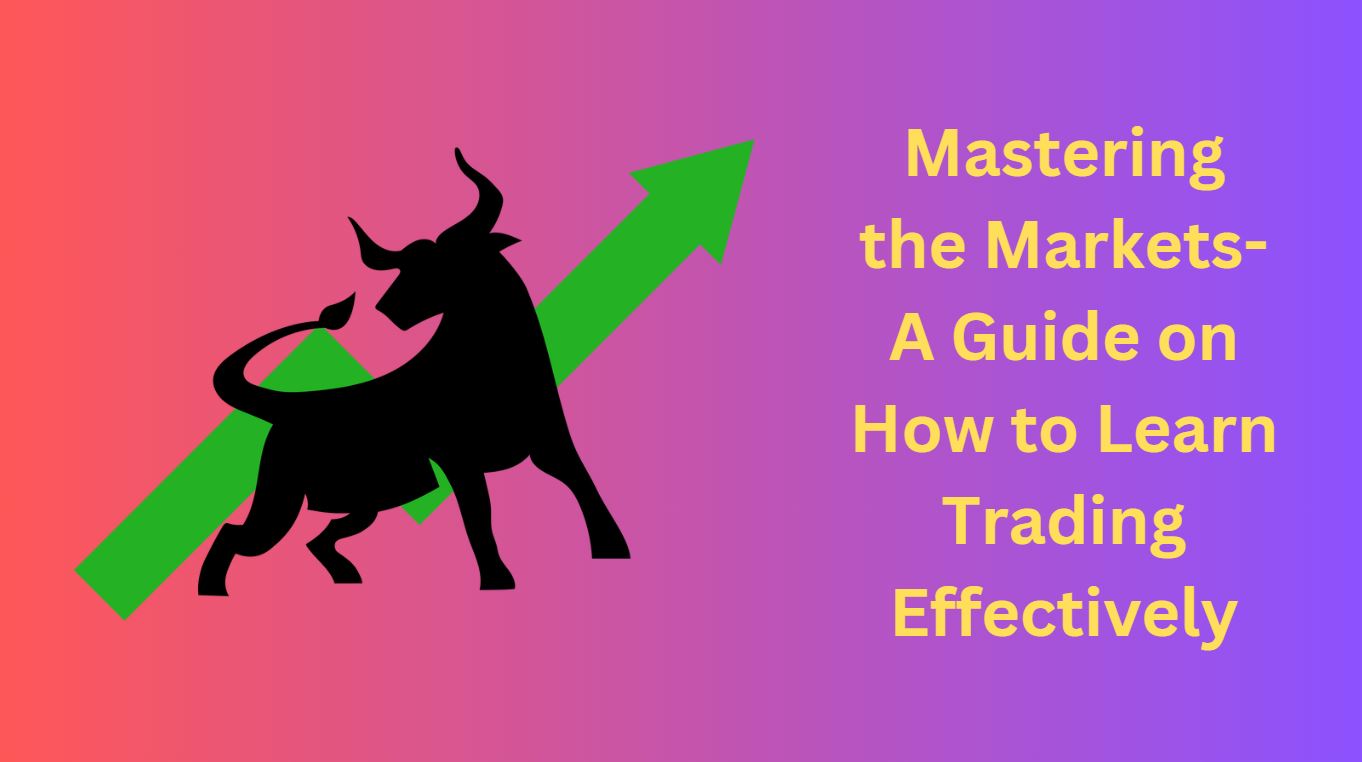- Likes
- Followers
- Followers
- Followers
- Subscribers
- Followers
- Members
- Followers
- Members
- Subscribers
- Subscribers
- Posts
- Comments
- Members
- Subscribe
Mastering the Markets-A Guide on How to Learn Trading Effectively

If you want to invest in financial market and looking for the ways how to learn trading then in this article offers insightful advice on how to learn trading efficiently and how to advance your trading skills. Financial market trading can be an attractive commitment, but success demands dedication, knowledge, and talent. Gaining a thorough understanding of the markets is crucial for reaching your financial objectives and making wise decisions, regardless of your level of experience. Learning trading can be thrilling and profitable, but success demands a strong base of information and abilities.
This is an extensive manual to help you how to learn trading the right way.
1. Learn for Yourself
Start by learning the basics of trading instruments, financial markets, and various strategies. Assess reputable learning materials, books, online courses, and beginner-friendly guides. Employ learning tools like as books, webinars, online courses, and seminars to improve your understanding of technical analysis, risk management, and trading principles.
2. Select a Market
Trading includes a variety of marketplaces, including commodities, equities, FX, and cryptocurrencies. Choose a market that fits your interests, level of risk tolerance, and availability of time. Select which market you wish to trade in, which could be digital currencies, stocks, foreign exchange (FX) or commodity. Each sector is distinct and calls for unique strategies and skills.
3. Make and Work on a Trading Strategy
Create a thorough trading plan which outlines your goals, level of risk tolerance, entry and exit strategies, and guidelines for managing your money. A well-considered plan is your road map in the fast-paced world of trade. A thorough trading plan helps achieving your goals you have, trade administration instructions, entry and withdrawal approaches, portfolio measurement, and risk tolerance. Having a clear plan in place aids in maintaining focus and discipline as well.
4. Practice and Learn the Fundamentals with a Demo or Simulated Account
You can practice trading without risking real money by using paper trading or demo accounts. This enables you to practice, improve your techniques, and build confidence prior to trading with actual money. Trial accounts are available on many trading platforms, allowing you to practice trading with virtual money. You may test methods, improve your skills, and gain confidence with this practical experience without having to risk real money. Start by becoming familiar with the terms used in the market, the different kinds of securities, and the fundamental trading tactics. Build a strong knowledge base before engaging in active trading.
5. Recognize risk management
In trading, efficient risk management is important. To protect your money from huge losses, learn how to diversify your investments, establish stop-loss orders, and control trade size. Use appropriate risk management strategies to preserve your investment while minimizing losses. Avoiding risking more than just a little of your account on any one trade, diversifying your holdings, and using stop-loss orders are the basic practices which are highly recommended to learn before doing actual trade.
Posts You May Like
6. Stay Informed and Practice Emotional Discipline
Keep informed on global developments, economic statistics, and market news that could affect financial markets. Developing educated trading decisions will come from reading financial news on a regular basis and remaining aware. Corporate announcements that may affect asset values, economic indicators, geopolitical events, and financial events should be followed on daily basis. Making timely decisions based on current market conditions is facilitated by having knowledge. You should manage your feelings during trading by refraining from making immediate decisions motivated by greed or fear. Following your trading plan, practice patience when things become tough, and apply discipline to the way you carry out your approach.
7. Acquire knowledge of technical analysis
In technical analysis, future price movements are predicted by examining price charts and patterns. To improve your trading, become familiar with chart patterns, candlestick analysis, and technical indicators. To make wise trading decisions, learn to evaluate price charts and identify trends, patterns, and indicators. For the purpose of timing trades and forecasting market moves, technical analysis is essential. The dynamic field of trading requires continuous learning and adaptation. Remain curious, ask seasoned traders for their opinions, review your deals for accuracy, and keep improving your abilities.
8. Observe Profitable Traders
Participate in trading forums and social media platforms by following and interacting with successful traders. Taking note of their methods, realizations, and experiences might teach you important things for your own path.
9. Start Small and Build Up Gradually
As you gain knowledge and confidence, steadily raise your exposure from a small starting investment. Carefully scaling up minimizes risk and makes the learning curve more manageable.
10. Assess and Modify
Evaluate your trading results on a regular basis, consider both profitable and losing deals, and modify your approach as necessary. Being able to grow constantly is essential to being an expert trader.
Conclusion
Recall that becoming a trader is a journey that calls for commitment, lifelong learning, flexibility and analyzing stocks. You can start a rewarding journey towards mastering the markets and succeeding in your trading attempts by following these rules and maintaining a disciplined attitude.
Ultimately, you may improve your trading knowledge, abilities, and confidence in successfully navigating the financial markets by adhering to our guidance on how to study trading. To attain long-term trading success, keep in mind that understanding the markets is a journey that calls for dedication, diligence, and a desire to continually improve.
Image credit- Canva


[…] Mastering the Markets-A Guide on How to Learn Trading Effectively […]
[…] Mastering the Markets-A Guide on How to Learn Trading Effectively […]